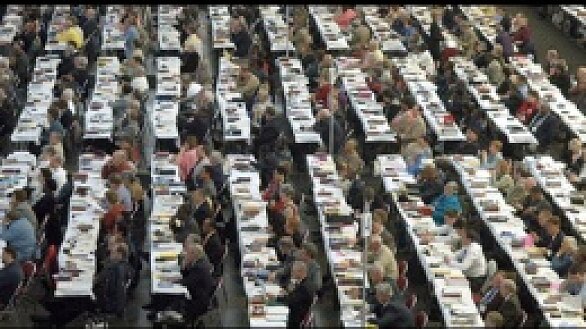Nashville, Tenn.: As the pandemic continues and the wait time for visas stretches to over two years in some countries, the Commission on the General Conference announced today that the 2020 General Conference cannot be held in 2022 due to COVID-related and governmental policies/constraints.
Commission members received a report based on conversations with multiple officials of the U. S. Department of State outlining the massive backlog of visa applications in some areas. This backlog has led to wait times up to 800+ days for scheduling an initial interview. In addition, commission members described an increasingly complex interview process in some areas requiring two or three interviews, which also creates a roadblock that would preclude participation by many delegates outside the United States of America. Commission chairperson Kim Simpson said the decision to postpone once again was an exceedingly difficult one, with many factors to consider -- including visas and passports, the health and safety of delegates, volunteers and other attendees, vaccination rates, and the need for provisions for quarantine or medical care should any delegates contract COVID-19.
"We engaged in a fair, thorough, integrity-filled discussion of the alternatives," said Simpson. "The visa issue is a reality that is simply outside our control as we seek to achieve a reasonable threshold of delegate presence and participation. Ultimately our decision reflects the hope that 2024 will afford greater opportunity for global travel and a higher degree of protection for the health and safety of delegates and attendees."
The Book of Discipline 2016 requires the Commission to take necessary measures to assure full participation of all General Conference delegates. Consistent with that guidance, the Commission determined that the physical attendance of as many delegates as possible at the General Conference is critically necessary.
A significant advantage of further postponing the 2020 General Conference to 2024 is that the Commission has already secured a venue for what would have been the regularly scheduled quadrennial event. An announcement about the location will be forthcoming as soon as the required logistical planning is complete.
According to Sara Hotchkiss, Business Manager of the General Conference, moving the legislative gathering to 2023 was an option that was discussed, but was not found to be feasible due to a number of reasons, including but not necessarily limited to the logistical challenges of planning, the remaining backlog of visa applications and interviews, and the proximity to the 2024 General Conference.
A technology study team appointed by the Commission reported in February 2021 that it wasn’t feasible to create a virtual alternative of the General Conference that would safeguard the integrity of the voting and credentialing process, meet legal requirements, and support the complexity of the legislative committees required by ¶507.11 including but not limited to interpretation in multiple languages, and meaningful participation across multiple time zones. While many churches and organizations have adapted technology for events that are based heavily on presenter/observer situations, that is not the type of gathering that embodies a General Conference. Full participation of delegates in Christian conferencing as a means of grace was not seen as possible under these circumstances.
Secretary of the General Conference, Gary Graves, said the further postponement raises a number of additional questions not specifically addressed in The Book of Discipline 2016. “As the postponed 2020 General Conference now enters the typical cycle of preparation for a General Conference that would have been held in 2024, we will need to look to the Judicial Council for clarity regarding which preparations and processes are based on the postponed 2020 General Conference and which would need to be enacted should this be seen as a new 2024 General Conference.”
The Judicial Council recently ruled that, “the deadlines for petitions submission in ¶ 507 are based on the date of the postponed General Conference and reset with each postponement.”
The Commission will meet again on March 28 to continue the work of preparing for the postponed 2020 General Conference and looking ahead for possible solutions that may help avoid delays in future meetings should unforeseen circumstances occur or persist.
Simpson expressed appreciation to all of those in the Dakotas-Minnesota Area who were involved in planning for hosting and providing volunteers for the Minneapolis event. “We want to recognize the efforts of everyone who has worked so hard over several years to provide a welcoming experience. We are grateful to James Haun for his leadership as Local Host Committee Chair and his service on the Commission on the General Conference,” said Simpson.
Hotchkiss added, “We appreciate the patience and understanding of the Local Host Committee as we have gone back to the drawing board on multiple occasions. They have been more than gracious.”
According to Graves, “It is always a monumental task to host the General Conference, but to prepare several times and still not be able to put those plans into action seems even more difficult. We look forward to ways that we will honor the efforts of the Dakotas-Minnesota Local Host Committee when we finally meet together.”
“The Commission appreciates that many people are disappointed about the circumstances of the 2020 General Conference and shares in the disappointment that it has not been able to be held,” said Simpson. “COVID-19 has tested the collective patience, understanding, compassion, resolve, and even faith of the world. Commission members remain hopeful and pray that the world’s circumstances improve to help make the next General Conference not only possible, but a reminder of the witness of The United Methodist Church as a global representation of the body of Christ.”


